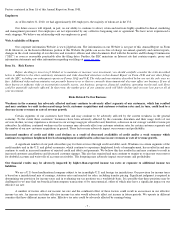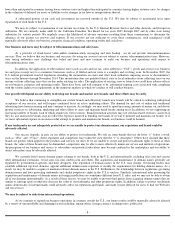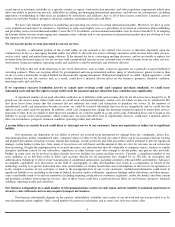eFax 2010 Annual Report Download - page 19
Download and view the complete annual report
Please find page 19 of the 2010 eFax annual report below. You can navigate through the pages in the report by either clicking on the pages listed below, or by using the keyword search tool below to find specific information within the annual report.
On December 24, 2009, COA Network, Inc. (“COA”)
filed a complaint in the United States District Court for the District of New
Jersey, seeking declaratory judgment of non-
infringement, invalidity and unenforceability of several of our patents. On March 3, 2010, we filed
an answer to the complaint and counterclaims asserting that COA infringes two of our patents. Also on March 3, 2010 we moved to transfer the
case to the United States District Court for the Central District of California, or in the alternative to stay the case. On June 17, 2010 the Court
granted our motion, transferring the case to the Central District of California. Discovery has not yet commenced.
On September 15, 2006, one of our affiliates filed a patent infringement suit against Integrated Global Concepts, Inc. (“IGC”)
in the
United States District Court for the Northern District of Georgia. On May 13, 2008, IGC filed counterclaims alleging violations of Section 2 of
the Sherman Act and breach of contract. IGC is seeking damages, including treble and punitive damages, an injunction against further violations,
divestiture of certain assets, attorneys’
fees and costs. On June 13, 2008, we moved to dismiss the amended counterclaims. On February 18,
2009, the Court granted our motion to stay the case pending the conclusion of our appeal of a summary judgment ruling of non-
infringement in
another case which involved the same patents and issues at issue in this action. On January 22, 2010, the Federal Circuit affirmed the District
Court’s non-
infringement ruling in the other case. On June 7, 2010 the Court lifted the stay. On July 16, 2010, we renewed our motion to dismiss
IGC’s amended counterclaims. Our motion was heard on February 15, 2011 and the Court has yet to issue a decision.
On May 9, 2007, Bear Creek Technologies, Inc. (“Bear Creek”)
filed suit against us in the United States District Court for the Eastern
District of Texas, alleging infringement of U.S. Patent Number 6,985,494 (the “ ‘494 patent”).
Bear Creek is seeking damages in at least the
amount of a reasonable royalty, a permanent injunction against continued infringement, treble damages, attorneys’
fees, interest and costs. On
June 29, 2007, we filed an answer to the complaint denying liability, asserting affirmative defenses and asserting counterclaims of non-
infringement and invalidity. On September 21, 2007, Bear Creek filed its reply to our counterclaims, denying each one. On February 11, 2008,
we filed a request for reexamination of the ‘
494 patent with the USPTO. On February 28, 2008, the Court stayed the case during the pendency of
the reexamination proceedings. On February 12, 2009, the USPTO finally rejected the reexamined claims and Bear Creek failed to file a
response within the prescribed timeframe. On June 16, 2009, the USPTO issued a right to appeal the examiner’
s rejection. Bear Creek filed its
appeal on September 16, 2009. We filed our response to Bear Creek’
s appeal on October 14, 2009. The Examiner provided an answer on June
18, 2010, agreeing with the great majority of our positions. Bear Creek's reply brief was filed July 19, 2010, and we are awaiting a decision on
Bear Creek’s appeal. On September 10, 2009, the Court “Administratively Closed” the case pending resolution of the reexamination proceeding.
On May 20, 2010, Lea Anne Wolfe filed a lawsuit against us in Los Angeles Superior Court. Wolfe asserted the following claims: (1)
physical disability discrimination in violation of the California Fair Employment and Housing Act (“FEHA”); (
2) failure to accommodate in
violation of FEHA; (3) failure to engage in the interactive process in violation of FEHA and (4) failure to pay wages in violation of California
Labor Code Sections 201 and 218. Wolfe sought compensatory damages (including back wages, unpaid wages, and emotional distress); interest
and costs; attorneys’ fees; a cease and desist order against us; and an order mandating us and our employees to undergo anti-
discrimination
training. We filed an answer on June 24, 2010. At the Case Management Conference on October 14, 2010, the Court ordered the parties to attend
private mediation, which took place on January 19, 2011. The parties entered into a settlement agreement on February 3, 2011, and in
conjunction with that settlement, dismissal of the action against us is pending.
On June 24, 2010, Demeter Technology, LLC (“Demeter”)
filed suit against twenty defendants, including us and an affiliate, in the
United States District Court for the Eastern District of Texas, Marshall Division. The complaint alleged infringement of U.S. Patent Number
6,157,706. Demeter sought a permanent injunction against us for continued infringement, and damages, as well as attorneys’
fees, interest and
costs. We settled the matter in December 2010. In connection with the settlement, the Court dismissed the case against us on December 27,
2010.
On September 7, 2010, Wordcheck Tech, LLC (“Wordcheck”) filed suit against fifty-
seven defendants, including us and two affiliates,
in the United States District Court for the Eastern District of Texas, Tyler Division. The complaint alleges infringement of U.S. Patent Number
6,782,510. Wordcheck is seeking a permanent injunction against continued infringement, damages, treble damages, attorney’
s fees, interest and
costs. We filed an answer to the complaint on November 18, 2010. Discovery has not yet commenced.
In December 2008, AGV Sports Group, Inc. and other co-plantiffs (collectively, “AGV”)
filed suit in the United States District
Court for the District of Maryland against the Company’s new-acquired subsidiary Protus IP Solutions, Inc. (“Protus”), three of Protus’
employees and other co-
defendants for allegedly sending at least 974 unsolicited fax advertisements to AGV in violation of the federal
Telephone Consumer Protection Act of 1991 (the “TCPA”) and the Maryland Telephone Consumer Protection Act (“MD-TCPA”).
AGV seeks
judgment against Protus and the individual Defendants for $500 for each alleged violation of the TCPA, trebled for willfulness pursuant to the
TCPA, and $500 for each violation of the MD-
TCPA. Protus filed a successful motion to dismiss for lack of personal jurisdiction on behalf of its
three employees named as individual defendants. The case is in discovery.
On February 17, 2011, Emmanuel Pantelakis (“Pantelakis”) filed suit against Protus in the Ontario Supreme Court of Justice alleging
that Protus beached a contract with Pantelakis in connection with Protus' e-mail marketing services. Pantelakis is seeking damages, attorneys’
fees, interest and costs. Protus has not yet filed a responsive pleading in the case.
j2 Global does not believe, based on current knowledge, that any of the foregoing legal proceedings or claims, after giving effect to
existing reserves, is likely to have a material adverse effect on the Company’
s consolidated financial position, results of operations or cash flows.
However, depending on the amount and the timing, an unfavorable resolution of some or all of these matters could materially affect j2 Global’
s
consolidated financial position, results of operations or cash flows in a particular period. The Company has not accrued for a loss contingency
relating to certain of these legal proceedings because unfavorable outcomes are not considered by management to be probable or reasonably
estimable.
In addition to the above-referenced matters, several pending proceedings were dismissed with prejudice following the Company’
s
acquisition of Venali, Inc. (
“
Venali
”
)
and Protus. These include the following:
























